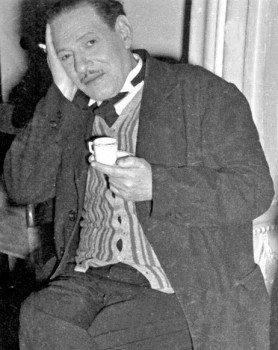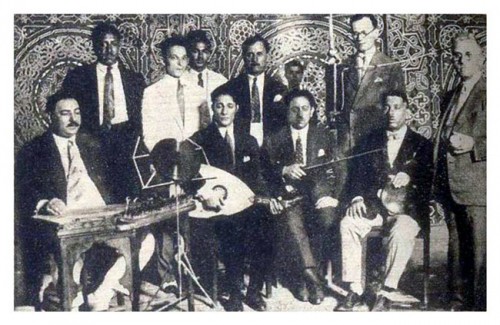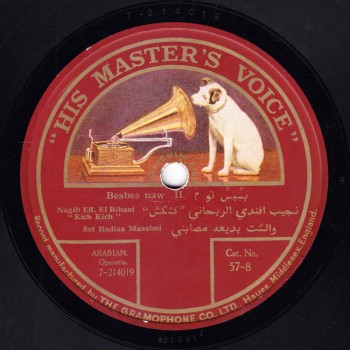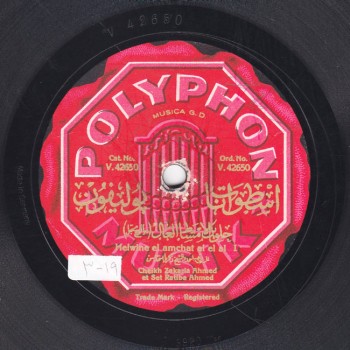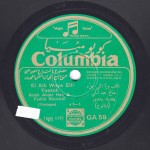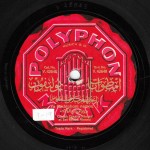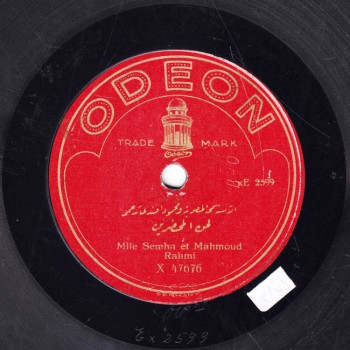 The Arab Music Archiving and Research foundation (AMAR), in collaboration with the Sharjah Art Foundation (SAF), presents “Durūb al-Nagham”.
The Arab Music Archiving and Research foundation (AMAR), in collaboration with the Sharjah Art Foundation (SAF), presents “Durūb al-Nagham”.
Dear listeners,
Welcome to a new episode of “Durūb al-Nagham”.
Today, we will be resuming our discussion about musical dialogues.
The next duet is “Ḥelwīn el-mshāṭ” with Sitt Ratība Aḥmad, also recorded by Polyphon. In “Ḥelwīn el-mshāṭ”, a person calls in the style of street vendors –indeed, all of Egypt’s street vendors at the time, whether they were selling fruit or something else, called in this singing style, following a simple melody and a simple maqām, the sikāh in this case. The duet is to a 4/4 measure, yet the percussionist, notably, sometimes lets the rhythm loose because he knows that at a certain point either Ratība or Zakariyyā will improvise. Also note the performance of Sāmī al-Shawwā and ‘Abd al-Ḥamīd al-Quḍḍābī when the scene becomes more passionate, i.e. when Zakariyyā goes from being a vendor selling hair combs to a man courting her, and when she starts answering him… the music is no longer only accompanying them: it has become a drama element of the scene. Moreover, we do not only have a duo anymore since the scene now also includes the instrumentalists, and later her husband who joins them. The dialogue becomes more crowded, yet the improvisation, the variations, and the ornamentation do not stop. Incredibly, Sheikh Zakariyyā was able to control this important and necessary element in Arab Music, i.e. improvisation, while avoiding the overcrowding of three voices singing together.
Let us listen to “Ḥelwīn el-mshāṭ”. This very important phase is a lesson in melody given to us by Sheikh Zakariyyā Aḥmad…
(♩)
Beautiful, Sheikh Zakariyyā!
Beautiful!
I was told that the third voice accompanying them –and I don’t think it is unlikely– is Ratība Aḥmad’s husband Kāmil al-Khula‘ī.
The song is great.
Beautiful.
Did Zakariyyā Aḥmad sing duets with others?
Of course he sang with others. He sang in Umm Kulthūm’s fawāzīr in the movie “Sallāma”, for example.
Najīb al-Rīḥānī was among the major figures of the Egyptian theatre, and he surely performed duets in plays.
Sheikh Sayyid Darwīsh composed for him at first, including the tune “Al-saqqāyīn”, followed by Dāwūd Ḥusnī, added to melodies Zakariyyā Aḥmad composed for him and that were recorded by Pathé. All his existing duets are with Sitt Badī‘a Maṣābnī –I am talking about the discs, not the movies he made after that. He also sang duets with Layla Murād…etc.
The melodies Dāwūd Ḥusnī composed for these theatre dialogues/duos show how good he was at what he did: when listening to Dāwūd Ḥusnī’s dawr “Sallimti rūḥak” or “Kull mīn yi‘sha’ gamīl”, or even the dawr he composed for Umm Kulthūm during the same period or a little later –I am referring to the period during which he composed duets for Najīb al-Rīḥānī and Badī‘a Maṣābnī– the latter ones including “Sharraf ḥabīb el-alb” or “El-bu‘d ‘allimnī el-sahar” are very substantial melodies. Whereas those he composed for Najīb al-Rīḥānī and Badī‘a Maṣābnī, while undoubtedly bearing his mark, are light and simple, allowing Najīb al-Rīḥānī and Badī‘a Maṣābnī’s modest singing voices to interpret them well, and to perform what was asked of them. Moreover, the lyrics themselves are also light: “Kish kish bēh” is a comedy. Yet the way Dāwūd Ḥusnī deals with light lyrics is not the same as Zakariyyā Aḥmad’s. Zakariyyā Aḥmad sings with Ratība Aḥmad, and both having a rich voice, they could interpret any melody. While the voice Dāwūd Ḥusnī is dealing with now is a modest singing voice. Despite this, clearly knowing what he was doing, he was able to make these two persons sing well. If we listened to a dialogue like “Bis bis naw” played by a band including a piano, a flute, and a violin, while the singers are singing to the rāst, we will notice that Najīb al-Rīḥānī and Badī‘a Maṣābnī sing correctly and that the melody served its purpose. There is no chasm or anything foolish. There is serious work included in this. He went by Sayyid Darwīsh’s system in fixing everything from the beginning to the end. In fact, he went beyond Sayyid Darwīsh since he dealt with muṭrib with modest voices and composed for them an ornament-free melody. There was no need for ornaments to beautify the melody whose beauty lies in its simple details, and that only asked from them to sing.
Let us listen to this simple and beautiful melody and to the voices of Sitt Badī‘a Maṣābnī and Najīb al-Rīḥānī…
(♩)
A beautiful melody indeed…
When ‘Abd al-Wahāb started performing in musical movies in the 1930s, he sang duets with a significant number of muṭriba.
And even non-muṭriba. Layla Murād was of course a muṭriba, but Ra’ya Ibrāhīm was not, yet he made her sing. … ‘Abd al-Wahāb was a master too.
But he surely sang duets before playing in movies.
He did, when he first started recording, while some say Maḥmūd Raḥmī had composed them, not him. He recorded two discs and sang four beautiful duets with Samḥa al-Maṣriyya.
I really like “ ‘Ala kubrī aṣr el-nīl”.
“Nōba ‘ala kubrī aṣr el-nīl” is the tune of the Egyptian scouts. Such songs, for example, document ill-known social phenomena. People knew that those who clowned around were the military, or the mihtār in Turkey…etc. Yet for a civil band, such as the scouts’ band, to jump from the bridge over the Nile, or to climb the two lions, i.e. to perform such phenomena that were new in the second and third decade of the 20th century is something he documented in this work, added to many other works.
Let us listen to “Nōba ‘ala kubrī aṣr el-nīl”, … a good and beautiful duet…
Who composed it?
It is poorly documented, but I think Maḥmūd Raḥmī composed it, maybe with the participation of ‘Abd al-Wahāb… The matrixes around it are all of Maḥmūd Raḥmī.
Let us listen to it…
(♩)
Since we are talking about Maḥmūd Raḥmī and Samḥa al-Maṣriyya, let us add that these songs also included social criticism. Some tunes depicted the social attitude of balṭajiyya (thugs) for example, the behaviour of a certain social class of people.
One of Samḥa’s songs, also composed by Maḥmūd Raḥmī, is supposed to be a duet between her and Maḥmūd Raḥmī himself… yet it turned out to be different.
The tune “Al-muḥḍarīn” (muḥḍarīn are the policemen who arrest those who did not pay their debts, and seize their belongings) depicts how banks lent people money, then how people were unable to pay their debt and how the banks would then confiscate their lands or their apartments…etc., and how the lady would try to beg them not to…etc. A group of muḥḍarīn sings and one person, Samḥa al-Maṣriyya, answers them… producing a continuous sequence of questions and answers between the single voice of the solo performer and the group that talks as one: the group says “we” and she says “I”, the government representatives v/s the representative of the people, the contrast between the ensemble of male voices v/s the solo female voice.
Also note that the melody of “Al-muḥḍarīn” follows the pattern of an old ṭaqṭūqa… I only discovered this when I found the cylinder recording among AMAR’s acquisitions. The song is clearly composed on the pattern of ṭaqṭūqa “Lā li-al-‘atab lā lā”: he built a whole song onto the same melody.
Let us listen to the tune “Al-muḥḍarīn” and the social criticism included in the works created early in the third decade of the 20th century…
(♩)
A nice tune…
Nice and pleasant, even though it includes social criticism… yet it is fast and pleasant, and one can clearly feel the presence of policemen and people fighting.
Dear listeners,
We have reached the end of today’s episode of “Durūb al-Nagham”.
We will meet again in a new episode to resume our discussion about Musical Dialogues.
This episode was presented to you by Mr. Kamal Kassar.
“Durūb al-Nagham”.
- 221 – Zakariyya Ahmed – 12 (1/9/2022)
- 220 – Zakariyya Ahmed – 11 (1/9/2022)
- 219 – Zakariyya Ahmed – 10 (11/25/2021)
- 218 – Zakariyya Ahmed – 9 (10/26/2021)
- 217 – Zakariyya Ahmed – 8 (9/24/2021)
- 216 – Zakariyya Ahmed – 7 (9/4/2021)
- 215 – Zakariyya Ahmed – 6 (8/28/2021)
- 214 – Zakariyya Ahmed – 5 (8/6/2021)
- 213 – Zakariyya Ahmed – 4 (6/26/2021)
- 212 – Zakariyya Ahmed – 3 (5/27/2021)
- 211 – Zakariyya Ahmed – 2 (5/1/2021)
- 210 – Zakariyya Ahmed – 1 (4/28/2021)
- 209 – W-al-Lāhi lā astaṭī‘u ṣaddak 2 (4/6/2017)
- 208 – W-al-Lāhi lā astaṭī‘u ṣaddak 1 (3/30/2017)
- 207 – Bashraf qarah baṭāq 7 (3/23/2017)


